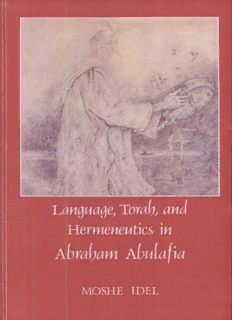
Language, Torah, and hermeneutics in Abraham Abulafia PDF
Preview Language, Torah, and hermeneutics in Abraham Abulafia
Language, Torah, and Hermeneutics in Abraham Abulafia This One G3H9-7J0-CDLH SUNY Series in Judaica: Hermeneutics, Mysticism, and Religion Michael Fishbane, Robert Goldenberg, and Arthur Green, Series Editors Language, Torah, and Hermeneutics in Abraham Abulafia Moshe Idel Translated from the Hebrew by Menahem Kallus State University of New York Press In memoriam Gershom G. Scholem Published by State University of New York Press, Albany ® 1989 State University of New York All rights reserved Printed in the United States of America No part of this book may be used or reproduced in any manner whatsoever without written permission except in the case of brief quotations embodied in critical articles and reviews. For information, address State University of New York Press, State University Plaza, Albany N. Y 12246 Library of Congress Cataloging-in-Publication Data !del, Moshe, 1947- Language, Torah, and hermeneutics in Abraham Abulafta. (SUNY series in Judaica) Bibliography: p. Includes indexes. 1. Abulafia, Abraham ben Samuel, 1240-ca. 1292. 2. Cabala - History. 3. Ecstasy (Judaism) 4. Hebrew language - Philosophy. 5. Bible. O. T. - Criticism, interpretation, etc., Jewish. I. Title. II. Series. BM526.I339 1988 296.16*0924 87-33630 ISBN 0-88706-831-6 ISBN 0-88706-832-4 (pbk.) 10 9 8 7 6 5 4 3 21 Contents Acknowledgments vii Introduction ix 1. Abulafia's Theory of Language 1 2. The Meaning of the Torah in Abulafia's System 29 3. Exegetical Methods in the Hermeneutical System of Abulafia 82 Transliteration Note 125 Abbreviations 127 Notes 131 Subject Index 201 Author Index 205 Index of Cited Works 209 Acknowledgments The present volume, like that dealing with The Mystical Experi- ence in Abraham Abulafia, is part of a doctoral dissertation on Abra- ham Abulafia's Kabbalah, submitted at the Hebrew University, Jeru- salem 1976. Since then, several unknown sources and perspectives have enriched the content of the expanded chapters devoted to the concept of language, Torah, and exegetical methods. As in the above volume, the presentation offered is heavily based on the significant texts of Abulafia, this being a deliberate effort to allow as direct an encounter as possible with Abulafia's formulations in his manuscript writings. The topics dealt with here belong to a neglected area of kabbalistic thought: They were rarely mentioned by Scholem in some of his phenomenological discussions on kabbalistic subjects, and they are absent from others, such as his important article on the Torah in Kabbalah. This study is the first elaborate attempt to describe the views of one kabbalist, who was deeply interested in linguistic Kabbalah and also contributed some daring, even eccentric insights, into the possibilities included in kabbalistic exegesis. In comparison to modern criticism, like deconstructionism, it seems that Abulafia's hermeneutics is an extreme method, which deconstructs the text to its letters to reconstruct it in new ways. Thanks are due to several institutions who contributed to the emergence of this volume; first and foremost, to the Institute of Microfilms of Hebrew Manuscripts of the National and University Library in Jerusalem, where the material used here was perused; to the National and University Library in Jerusalem; to the Memorial Foundation for Jewish Culture in New York, whose grants allowed vii viii Acknowledgments the writing of the first version of this study and, later on, continua- tion of studying additional manuscripts indispensable for a better understanding of the ecstatic Kabbalah; and, finally, to all the librar- ies which kindly allowed the use and printing of the manuscript mate- rial included in this volume. Mr. Menahem Kallus has translated with patience and dedication most of the material included in this volume. Thanks to Prof. Elliot Wolfson, who went through the whole manu- script and suggested many improvements for its English rendering. The time required for the studies, writing, rewriting, and checking of the material at all its stages was diverted from my family, whose sup- port enabled me to finish this manuscript. Introduction The Kabbalah of R. Abraham Abulafia is known by two names, both used by him in his writings: the ecstatic Kabbalah, literally the prophetic one, Kabbalah Nevu'it, namely that type of mysticism that instructs the Kabbalist to attain a mystical experience conceived of as prophecy; and the Kabbalah of the Names, that is, the divine Names (Kabbalat ha-Shemot), or that type of mysticism that shows the way for attaining that ecstatic experience. This path focused upon practices of reciting the divine names and various combinations of letters of the Hebrew alphabet.1 The technique of combining letters, used to attain experiences, was also applied in the hermeneutic sys- tem of this Kabbalist, as an advanced exegetical method that enables the mystic to penetrate the most recondite strata of Scripture. It is the apex of a most complex exegetical path that passed unnoted by modern scholarship of Kabbalah and Jewish hermeneutics and which will be exposed here for the first time in a detailed way. To under- stand, however, the prime-matter to which these hermeneutical devices were applied, we shall survey the views of Abulafia and some of his followers concerning the nature of language and their concep- tion of the Torah, the main object of the hermeneutical endeavour. We may describe Abulafia's view of language and interpretation as basically inclined to an allegorical perception, which influenced his conception of the Torah, his own revelations, and his interpreta- tions of his revelations. In the line of medieval Aristotelianism, the allegory hints at the psychological processes which consist in the changing relationship between the inner powers: intellect and imagi- nation. Interpretation of Scripture and of his revelations leads him, time and again, to decode texts and experiences as revealing ix
